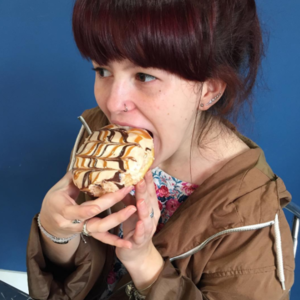I have Sensory Processing Disorder (SPD) which means that my brain tends to overreact when communicating with my sensory signals. Much like how I have my dramatic flair, my nervous system has its own, too.The amplification of my senses are limited to my sight, hearing and touch– my touch being the most magnified.
When I throw on a polyester shirt, I understand that the shirt is just polyester, but my brain insists that I am being enveloped by a blanket of fire ants. The feeling of every stitch and fiber of the shirt is exaggerated by my nervous system and I become so overwhelmed by a dumb shirt that I cannot bear to wear any fabric other than cotton because I will collapse into a pile of distressed brain signals and messy hair.
But this sort of sensation is not limited to my skin. Every nerve ending in my body is ultra-sensitive, including the nerves in my mouth and on my tongue. My SPD affects me every day of my life, but it hurts me most when it comes to food. I adore food. Food is an experience and my SPD is not keen on allowing me to enjoy it entirely.
One of the things that makes food so exciting and wonderful is what I am overwhelmed by most– the texture. Some people avoid grapes and blueberries because they dislike the way the fruits pop in their mouth. I see grapes and blueberries and I recoil into myself because I remember the burst of juice, skin and flesh of the fruit being so staggering that it is almost painful.
This is especially true with oranges. I adore the smell of citrus. Grapefruit, lemon, clementines, key limes – they all smell so lovely and their incredibly bright color makes them even more enticing than they already are. I drink orange juice, squeeze lime on my food and drop lemon wedges in my water but it would be a complete and utter catastrophe if I ate a citrus fruit.
I have only eaten oranges twice before. The first time, I was four years old at a Thai restaurant with my parents. An orange slice was set on my mother’s dish as a garnish. She passed it to me and I popped it in my mouth without question. As I was chewing, I began to cry. I had never experienced such an overwhelming food.
The second time I ate an orange was rather recently. I was so excited to eat this orange because as I peeled it, which was actually very difficult to do, some juice was squeezed out and the scent was glorious and refreshing as it overpowered the musty humidity of a 60-year-old dorm. I was so ready to devour this delicious, compact, pre-cut by nature snack.
But, as the world would have it, the experience was awful. It felt like I would imagine Pop Rocks feel. It was explosive and so staggering that I had to take a step back to steady myself.
Telling people that I have supernatural senses is always a great conversation starter but the condition itself isn’t all that super. It’s wildly overwhelming to have constant stimulants and distractions. This especially applies to food because eating is more than feeding yourself. Eating is socializing and appreciating the art of food. Thankfully, not every food elicits a chaotic response from my brain, so I am still able to enjoy a variety of dishes with people and food that make me happy.
P.S. No one told me my hands were going to smell like oranges for the next millennium so if you don’t peel oranges often, this is me giving you a heads up.


